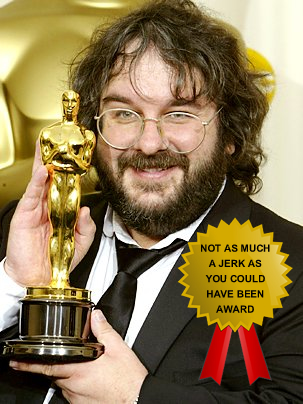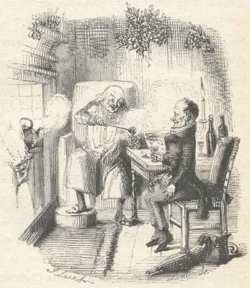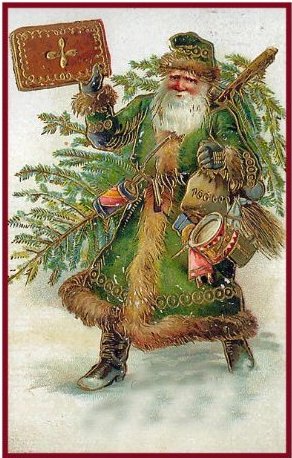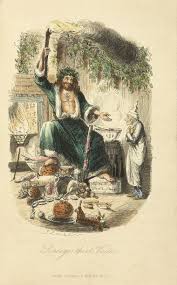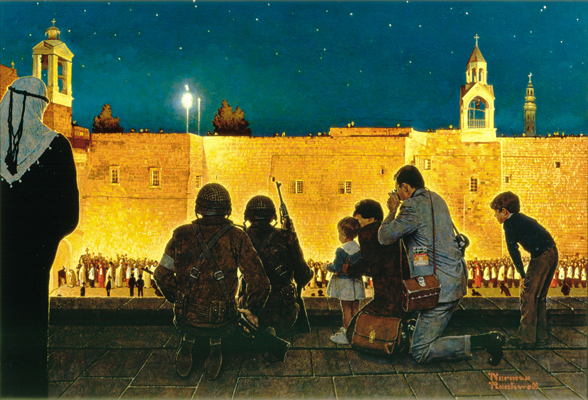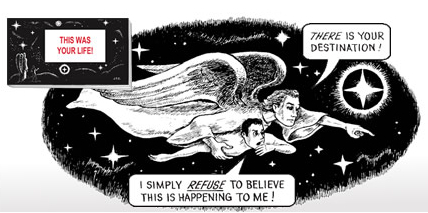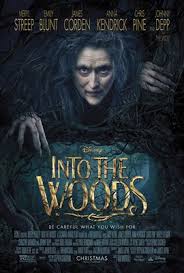Why do some Christians insist on pitting Santa vs. Jesus Christ the Hero of Christmas, when they wouldn’t do the same with any other good gifts in their families, churches or cultures?
Today I found this inconsistent, glum, and Gospel-reductionistic perspective on Santa as displayed by John Piper, in a micro-podcast and its transcription called ‚ÄúRethinking Santa.‚ÄĚ
Piper is a now-retired pastor and current author, most famously of the book Desiring God: Meditations of a Christian Hedonist. But his thoughts on whether Santa Claus can be a part of Christmas celebrations (hint: no) aren’t very Christian-hedonistic.

Santa Claus, per some Christians’ imaginations.
Jesus vs. Santa: Piper’s false dichotomy
It is mindboggling to me that any Christian would even contemplate such a trade, that we would divert attention away from the incarnation of the God of the universe into this world to save us and our children.
This warning is needed for Christian parents or children who are careless about Christ and act as if good things like legends, games of pretend, and material gifts are a sinful replacement ‚Äúchief end of man,‚ÄĚ even for a day or a season.
But why insist that this is the only way Christians would use Santa?
Does every Christian parent or even the majority of Christian parents enjoy Santa games for idolatrous reasons, as only unhealthy competition to Christ? That isn‚Äôt how I saw him. When I was a child, my parents presented Santa (intentionally and otherwise) as a symbol of the bountiful gifts in Christ. Santa was not a ‚Äútrade‚ÄĚ but an effective delivery service for a few small things that also show the Savior‚Äôs bountiful love. He gives every good gift, though these gifts must be made holy through the word and prayer (1 Tim. 4:1‚Äď5).
Not only is Santa Claus not true ‚ÄĒ and Jesus is very truth himself ‚ÄĒ but compared to Jesus, Santa is simply pitiful, and our kids should be helped to see this.
This warning is needed for any Christian parents who have a low or un-biblical view of the amazing Hero, Jesus Christ, Who is absolutely the central Figure of Christmas.
But shall we apply this same warning for all Christians, presuming they are so immature that they cannot handle other heroes, real or imaginary, lest they distract from Christ? What if we said, ‚ÄúCompared to Jesus, Charles Spurgeon is simply pitiful.‚ÄĚ ‚ÄúCompared to Jesus, Aslan of The Chronicles of Narnia is simply pitiful.‚ÄĚ ‚ÄúCompared to Jesus, John Piper is simply pitiful.‚ÄĚ ‚ÄúCompared to Jesus, Bilbo Baggins of The Hobbit is simply pitiful.‚ÄĚ And what about other good gifts of Jesus? Compared with Him, food is pitiful, married romance and sex is pitiful, children are pitiful, church politics are pitiful.
Yes, all these are true! But do we only ever issue dour warnings about these gifts? This is an overly self-abasing ‚Äúworm theology‚ÄĚ way to live, as if under constant suspicion that mature Christians are still totally depraved and cannot enjoy gifts lest they distract from Jesus. Yes, these can distract from Jesus. But the best way to prevent this is to see gifts as His gifts.
Santa Claus offers only earthly things, nothing lasting, nothing eternal.
This warning is needed for Christians who haven’t been learning, or teaching their children, an eternal perspective that is informed by Scripture.
But what about parents who are teaching this? Do they not have freedom to enjoy (or not enjoy) holiday traditions and myths?
Jesus offers eternal joy with the world thrown in ‚ÄĒ the fire engine is thrown in (1 Corinthians 3:21‚Äď23).
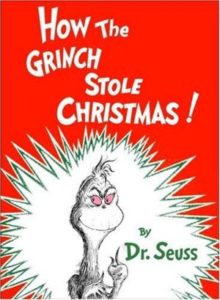
Is Santa only the Grinch who steals Christmas from Jesus?
I‚Äôm unsure what Piper means by ‚Äúthe fire engine is thrown in.‚ÄĚ If this is an allusion to Christmas gifts, such as toy fire engines, then this is just how Christian parents can (and some already do) enjoy Santa as part of their Christ-exalting holiday celebrations.
Santa Claus offers his ephemeral goodies only on the condition of good works: ‚ÄúHe knows when you are sleeping, he knows when you‚Äôre awake, he knows when you have been bad or good, so be good for goodness‚Äô sake.‚ÄĚ That is a pure works religion. And Jesus offers himself all the gifts freely, by grace, for faith.
This warning is certainly needed for Christians who effectively run their homes according to works-righteousness religion (and there are far too many of those).
But who decided that Santa-celebration must always be paired with the ‚Äúmaking a list and checking it twice‚ÄĚ notion? Last I checked, there is no civil or religious statute that forces parents to accept the whole popular-culture package. Rather, if they want to enjoy Santa as part of their Christ-exalting holiday celebrations, they have the freedom ‚ÄĒ and I would argue, they also should ‚ÄĒ to reject the works-righteousness part and embrace the lavish-giving-and-grace part. It turns out many popular adaptations of the Santa story do this already.
Santa Claus only shows up once a year. […] Santa Claus cannot solve our worst problem. […] Santa Claus is not relevant in many cultures of the world.
This warning is needed for any Christians who sinfully promise their children that Santa is actually omnipresent, or that Santa is the solution to our worst problem of rebellion against God, or that Santa is a global phenomenon.
But where are those people?
Many Christian parents are certainly careless about their Santa presentations. Children will fill in the gaps with all manner of notions and imaginations. Children can lose track of what‚Äôs fantasy and what‚Äôs reality. But even in that case, Piper again presumes parents are incapable of enjoying the Santa legend but also in perspective. Parents can teach: ‚Äú‚ÄėSanta‚Äô is one of Jesus‚Äôs little helpers.‚ÄĚ It’s easy ‚ÄĒ if your children are able to listen and enjoy, rather than abuse the fantasy into an idol. If your children make it an idol, then re-evaluate.
Santa Claus will be forgotten some day and Jesus ‚Äúis the same yesterday and today and forever‚ÄĚ (Hebrews 13:8).
This warning is needed if parents, in belief or practice, uphold Santa as equivalent to Jesus.
But why presume that Santa Claus will be forgotten someday?
For my part, I will always remember how God used the Santa fantasy to impress on me the wonder and joy that is ultimately found in Him alone. I will always remember Christmas, Santa and gifts and all, as an extra-special time to celebrate God‚Äôs gifts such as family and toys and celebrate the Giver in His human incarnation. I will always remember everything, come to think of it ‚ÄĒ even if Santa did turn out to be evil! No Scripture says that, as George MacDonald said, Christians will be greater fools in eternity than we are here. Rather, in Heaven (and then the New Earth, Rev. 21), redeemed saints will begin to see how God used everything ‚ÄĒ gifts, abuses of gifts, sins, and good acts alike ‚ÄĒ as part of His Story.
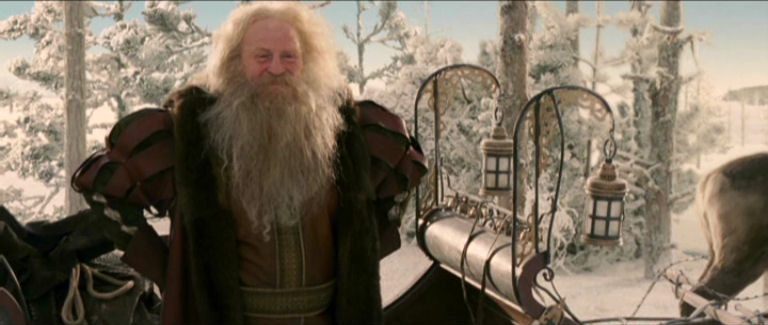
‚ÄúA Merry Christmas! Long live the true King!‚ÄĚ
Father Christmas, servant of Aslan
Oddly enough, one of the best ways to start seeing Santa and any other cultural legend in light of the Gospel, is taught in the 2013 Desiring God conference messages about the life and beliefs of C.S. Lewis. Lewis believed that even pagan myths can reflect the True Myth. Piper himself credited this view in his messages ‚ÄúC.S. Lewis, Romantic Rationalist: How His Paths to Christ Shaped His Life and Ministry,‚ÄĚ and ‚ÄúWhat God Made Is Good ‚ÄĒ And Must Be Sanctified: C.S. Lewis and St. Paul on the Use of Creation.‚ÄĚ
Despite knowing this in other ‚Äúdepartments,‚ÄĚ Piper concludes about the Santa ‚Äúdepartment‚ÄĚ:
I cannot see why a parent, if they know and love Jesus, if they have found Jesus to be the greatest treasure in the world, why they would bring Jesus out of the celebration and Santa into the celebration at all ‚ÄĒ I mean, he is just irrelevant. He has nothing to do with it. He is zero.
Honestly, this is even worse reductionism. It‚Äôs plain personal opinion, possibly one that is stigmatized by some parents‚Äô sins and abuse of the tradition. But it is neither consistent with Piper‚Äôs own approval of Lewis‚Äôs ‚Äúredeeming pagan myths‚ÄĚ views, nor with Scripture.
Piper’s own effective mentor, C.S. Lewis, showed exactly how Christians can bring Santa into the celebration of Jesus Christ.
In The Lion, the Witch and the Wardrobe, Father Christmas finally enters the frozen land of Narnia that his master, Aslan, has begun to thaw. Father Christmas reflects the traditional figure 100 percent. He has a sleigh with reindeer, a sack full of gifts, and magical abilities including the power to enter locked rooms and leave gifts. But he also serves Aslan, Narnia’s king, as Aslan’s noble follower. In fact, if Aslan is a type (the better term is supposal) of Christ, then Father Christmas is a type of Aslan.
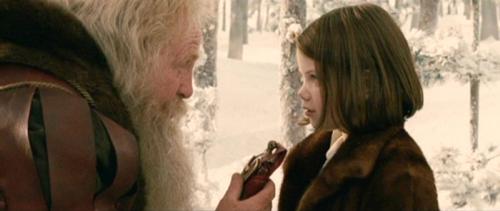 Father Christmas provides for the children’s and the Beaver couple’s immediate needs.
Father Christmas provides for the children’s and the Beaver couple’s immediate needs.
Father Christmas even provides a small feast, hearkening to future celebration of victory.
Father Christmas distributes gifts that are wonderful yet also suited to each child‚Äôs abilities and real-world callings. I love it when he says, ‚ÄúThese are tools, not toys.‚ÄĚ Some of the best gifts I can remember as a child were just that: tools, not just toys. I still have many of them.
Father Christmas honors Aslan as his own lord and savior. As he leaves he shouts, ‚ÄúA Merry Christmas! Long live the true King!‚ÄĚ ‚ÄĒ honoring, yet redeeming, the original legend.
Go deeper
Over the past years of Christmases at SpecFaith we’ve had much to say about Santa Claus.
Our latest will be I Believe in Father Christmas, coming this Friday from Timothy Stone.
Here’s a preview of this wonderful article:
There, in that small Air Force chapel in Kuwait, we shut off the lights, took lit candles, and passed them around. In hushed tones, we began to sing ‚ÄúThe First Noel.‚ÄĚ
I remember looking around as I sang, looking at everyone’s faces faintly illuminated by the candles that we all held. So many different denominations, believers and lost alike, and countries of origin, were represented. Yet here we were, on Christmas Eve, thousands of miles from home, and we were all happy. Most people would wonder at that, that joy that we all seemed to feel that night, given where we were, but I know it was really what was in our hearts.
That is when I believe I saw Father Christmas ‚ÄĒ when I saw Santa Claus.
See also:



































 r, better yet, the commercial racket of Christmas. It’s entrenched in two of our most iconic Christmas stories: A Charlie Brown Christmas (Charlie Brown won’t let commercialism ruin his Christmas!) and Miracle on 34th Street. (Imagine a New York accent with me: “Make a buck, make a buck …”)
r, better yet, the commercial racket of Christmas. It’s entrenched in two of our most iconic Christmas stories: A Charlie Brown Christmas (Charlie Brown won’t let commercialism ruin his Christmas!) and Miracle on 34th Street. (Imagine a New York accent with me: “Make a buck, make a buck …”)


